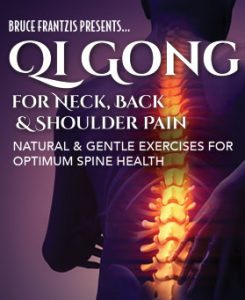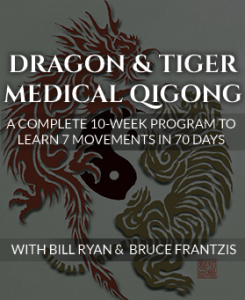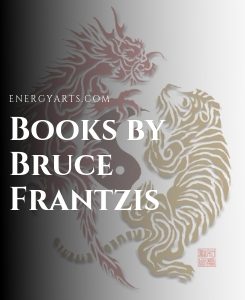The Dao of Sprouting
生之道
The three months of spring are called putting forth and displaying.
Heaven and Earth all sprout. The ten thousand things become lush.At night to bed, early to rise.
Briskly walk around the courtyard.
Let your hair down and relax the body in order to make that which is of the heart/mind sprout.
Sprout but do not kill.
Give but do not take.
Reward but do not punish.
This is the Spring compliance of qi (and) the cultivation of the Dao of sprouting.
To oppose these principles injures the liver.
(Consequently) Summer will bring cold changes, (and) there will be little to offer one’s growth.
—Neijing, Chapter 2
Spring is the time of sprouting. The Chinese character that I translate here as ‘sprouting’ is sheng 生, which depicts a plant growing out of the earth. It means ‘to begin to open’, ‘to begin to blossom’ and more generally, ‘to come into existence’, ‘to give birth’, ‘to live’.
The months of spring are called ‘putting forth fa,發 and displaying chen, 陳.’ Fa means ‘to send out’, ‘to emit’, ‘to release’ like an arrow from a bow. It is the same word that we use in Taiji in the phrase fa jin 發勁, the ability to release a great deal of power with little effort. Chen means ‘to spread out’, ‘to arrange’, ‘to display’. Spring, then, is the time of opening when everything in the world begins to grow, sending out shoots and buds.
The yin of winter is followed by the yang of spring.
This is the time to return to activity, ‘briskly walking around’ after having hibernated over winter. The energy that we have been storing can now be used and enjoyed. Still, we are reminded to let our hair down and to relax the body. Interestingly, the character for the word most commonly used for relaxation in the internal arts, song, 鬆 depicts long hair 髟 hanging down.
Being more energetic does not mean that we have to be tense, either physically or mentally. Relaxation allows the zhi 志,
that which is of the heart/mind, to sprout. The zhi was spoken of in our passage from the Nei jing on winter, which told us to keep it ‘as though hidden, as though concealed’, often translated as ‘will’, shi is the faculty which identifies and works towards goals and things that we want.
The character shows a plant growing out of the heart/mind and on the most basic level means ‘that towards which the heart is growing’ and more generally ‘goal’, ‘purpose’, ‘wish’.
Remember that for the Daoists (Taoists) the heart/mind is our true self, not our ego junk. ‘That towards which the heart is growing,’ is about becoming genuinely ourselves.
Now is the time to activate the zhi through relaxed activity. It is a generous time of giving and nurturing life. It is a good time to reflect on the direction in which we are headed and the way we are proceeding.
Zhi is of the kidneys, now is the time when the energy that we stored in the kidneys comes to the surface to be used, just as fish return to the surface of the pond having spent all winter resting at the bottom.
In terms of the five elements, springtime is dominated by the element of Wood, mu 木. Wood is strong and flexible. It is what the poet Dylan Thomas called, ‘the force that through the green fuse drives the flower.’ Its organs are the liver and gallbladder.
Physically, the liver has to do with the putting forth and spreading out (fa chen) of qi and blood. It affects our flexibility and vision on all levels. In nourishing the tendons, it keeps us physically flexible and it makes the eyes bright and clear. It also has a strong effect on one’s mood and clarity of mind. It enables us to look and plan towards goals, mundane and spiritual, while giving us the mental flexibility to adapt to changing circumstances.
The functioning of the gallbladder is closely tied to that of the liver. Physically, it aids the digestion of fats and oils. Mentally and spiritually, it is the decision maker. It is what allows us to make split-second decisions and gives us the courage to take action.
This is why it is important to take special care of the liver in spring. When healthy, the liver and gallbladder enable you to move toward that which you have set your heart on. When unhealthy, it makes us short-tempered and angry. Anger arises when we are prevented from doing what we want to do.
A healthy liver can help us to respond more calmly to obstacles in our path; to smoothly adapt and change rather than getting stuck.
Spring is the beginning of the yang cycle of the seasons. Like all beginnings it starts slowly and gently. Doing the same will keep us healthy. It is tempting to rush out on the first warm, sunny day in Spring and go for a very long walk or cycle ride. This is too much too soon. It is always best to follow the season.
When the green tips of plants are just emerging, we can do the same in our activity, starting gently and slowly. Later, as the earth warms up and the plants grow more vigorously, we can follow suit.
Heaven and Earth is the neigong set that is particularly suited to spring, as it directly activates the wood element in the body. It clears and tonifies the liver. It helps all of the body’s tissues lengthen and grow, making it strong and flexible. It circulates blood and qi. Most importantly, it strengthens and harmonizes all of the opening and closing actions of the body, the natural pulsations of life.
Eating what is in season is always a very good way to comply with the qi of the time. So in spring, eat plenty of green leafy vegetables and sprouts, mung beans, broccoli, etc . . . When it is cool, cooking your food is better, but as it warms up you can eat more salads.
Read the next in the series:
Taoist Seasons – Summer – Fire Element
Taoist Seasons – Later Summer – Earth Element
Taoist Seasons – Autumn – Metal Element
Taoist Seasons – Winter – Water Element
© Matthew Brewer, 2010.






0 Comments